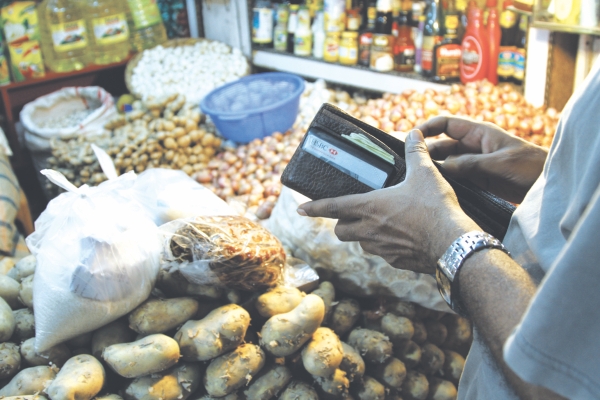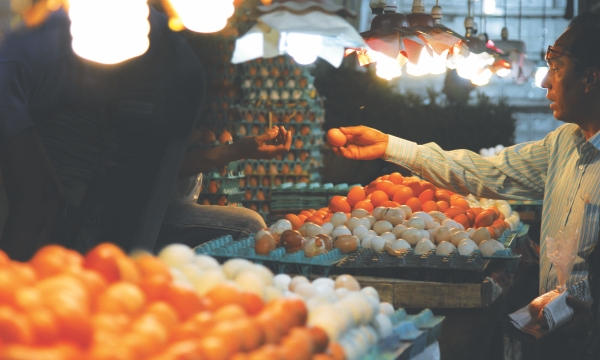| Home - Back Issues - The Team - Contact Us |
 |
| Volume 11 |Issue 10| March 09, 2012 | |
|
|
Special Feature The Cost of Living Akram Hosen Mamun
At the vegetable and fish markets of Dhaka, people are stunned by the price of everyday essentials. The price of food and non-food items has been shooting through the stratosphere in recent months. "I have made major compromises in the living standard of my family to survive the price hike of food and transport. Still I am finding it increasingly hard to pay for the meal we used to have before,” says Nabin, a sales representative of a pharmaceutical company. To be able to send his daughter to a school while having decent meals on the table, Nabin is thinking about taking up a part-time job. Not everyone has been so lucky. According to newspaper reports, inflation of non-food items ran over 13 percent in January, while the prices of food items increased by 11 percent. The growth rates set a record for being the highest in 15 years. Contrary to what many analysts tend to believe, the high inflation has caused an unprecedented decline in the real income of working class people, as the wage growth rate has been lagging far behind the growth rate of prices of everyday essentials. Jobbar Ali, a rickshaw-puller, is finding it difficult, even impossible to make ends meet. “I have to pay the rickshaw and garage owners nearly twice as much as I did a few years ago,” he says. He lives in a slum along the railway track in Shajahanpur with his wife, a domestic help, and fears that he might fail to pay the increased rent, following which his family will be evicted anytime. Since day-labourers, construction workers and rickshaw pullers do not have a fixed income, it is often thought that inflation does not hit them as hard as it hits people with fixed salaries. The rationale behind the assumption is that they increase their demands as prices of essentials go upward. But studies released by Bangladesh Bureau of Statistics (BBS) shows a different trend: in the last fiscal year, the wage growth rate in manufacturing and construction sector fell by 6 percent and in the agriculture sector by 10 percent. It is also important to note that unlike the last decade, most of the working and middle class families have more than one wage - earning member now. But their standard of living has not improved in any meaningful sense.
Although the prices of everything ranging from food to transportation to house rent soared alarmingly during the last couple of months, the trend has been pretty consistent for two years. Asked to justify the rise of food prices, wholesalers and retailers give different, and at times conflicting, reasons. “The cost of transportation of goods is now higher than anytime in the past. Moreover, the dilapidated inter-city highways damage the vehicles as well as the goods on the way,” says Morshed, a wholesaler who deals in vegetables in Karwan Bazaar. “The rising labour costs are also partly responsible for the price hike,” he adds. The retailers, in turn, blame it on the wholesalers and importers of food items. “Customers think that we make huge profit from the business and keep bargaining. They fail to see that we are as vulnerable to wholesalers' prices as they are,” says Jilani, who sells fruits and vegetable near Khilgaon rail crossing. He also asserts that he makes a nominal profit and has no control over the price of the products he sells. According to a BBS report, around 90 percent of Bangladesh's total labour force is employed in manufacturing, construction, agriculture, and fisheries sectors. There is no doubt that the consequences of declining income for such a large number of people will be manifold. In a ‘normal’ market, the price of a commodity is determined by its demand and supply in the market. If there is more supply than demand at a given time, the price falls. If demand exceeds supply, the price rises. However, the rising price of food commodities in our market cannot be explained by this theory alone. That lies only in the textbooks. The country's national food production has tripled since independence. Basic economic theories, do not justify the skyrocketing price of food as the growth rate of national food production has long surpassed the growth rate of population. Professor MM Akash, at Dhaka University, says that the present inflation cannot be explained with regular economic reasoning only. “The government's lack of control over market is also responsible for it. The syndicates, extortionists and the middlemen are also highly responsible for raising the price of everything,” he says. He hastens to add that large cartels also create an artificial food scarcity through speculative trading. Middlemen and a few price-fixing cartels control the sales, distribution and price of food and other everyday essentials. The 'free market', which is the heart of our economic system, is also controlled by them. They are the ones who get enormous profits from the rising prices of essentials, while news of farmers selling their crop at a loss is frequent.
Talking about other, more inevitable economic reasons behind the inflation, Akash says that there are two reasons behind the inflation: cost push and demand pull. “The cost push has been created because the government has increased the energy price, which immediately increased the production cost of almost everything,” he says. “On the other hand, the demand pull was caused by the huge deficit in government's budget. There was also the sudden increase in oil price that raised the cost of transportation. Increased transportation cost has also created a domino effect on the price of many commodities.” He thinks that the current inflation is mostly a failure of the government, saying if the government had taken proper policies, the inflation caused by cost push and demand pull would not have taken place. “The government also took a large amount of credit from the bank and spent it, a phenomenon that worsened the inflation,” he adds. Recent fuel and energy price hikes in the international market and the taka's devaluation against the US dollar have not failed to affect the local market of Bangladesh. But these issues mostly affect the price of non-food items. While our government has little control over these issues, it certainly has the means to contain the rate of inflation of food items. Also, the government can take measures to increase the wage growth rate. If it doesn't take any of these steps, an overwhelmingly large population will shear away in the dark. Copyright
(R) thedailystar.net 2012 |


